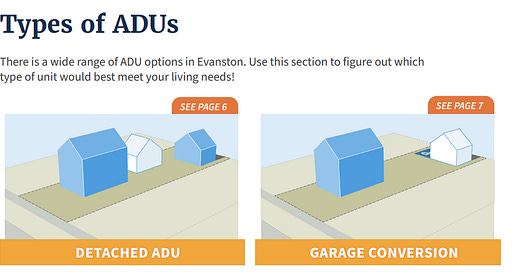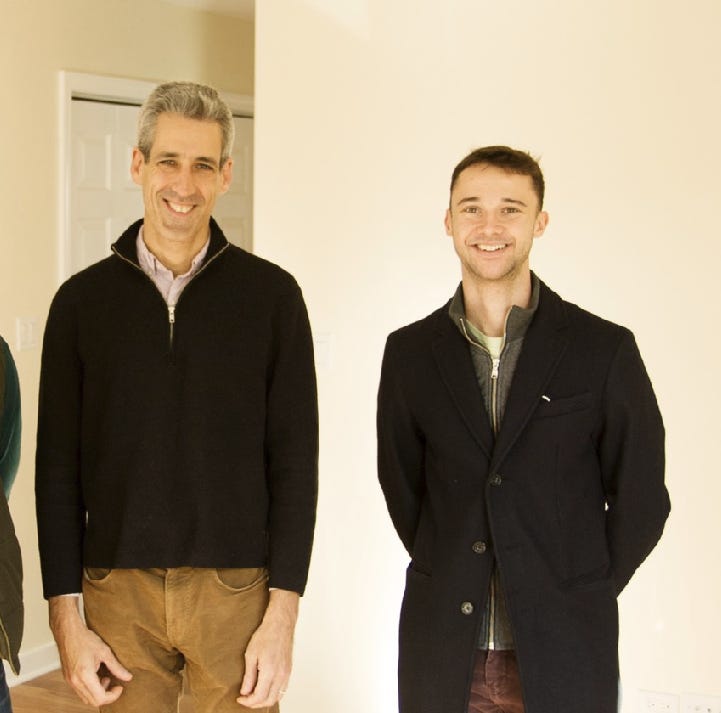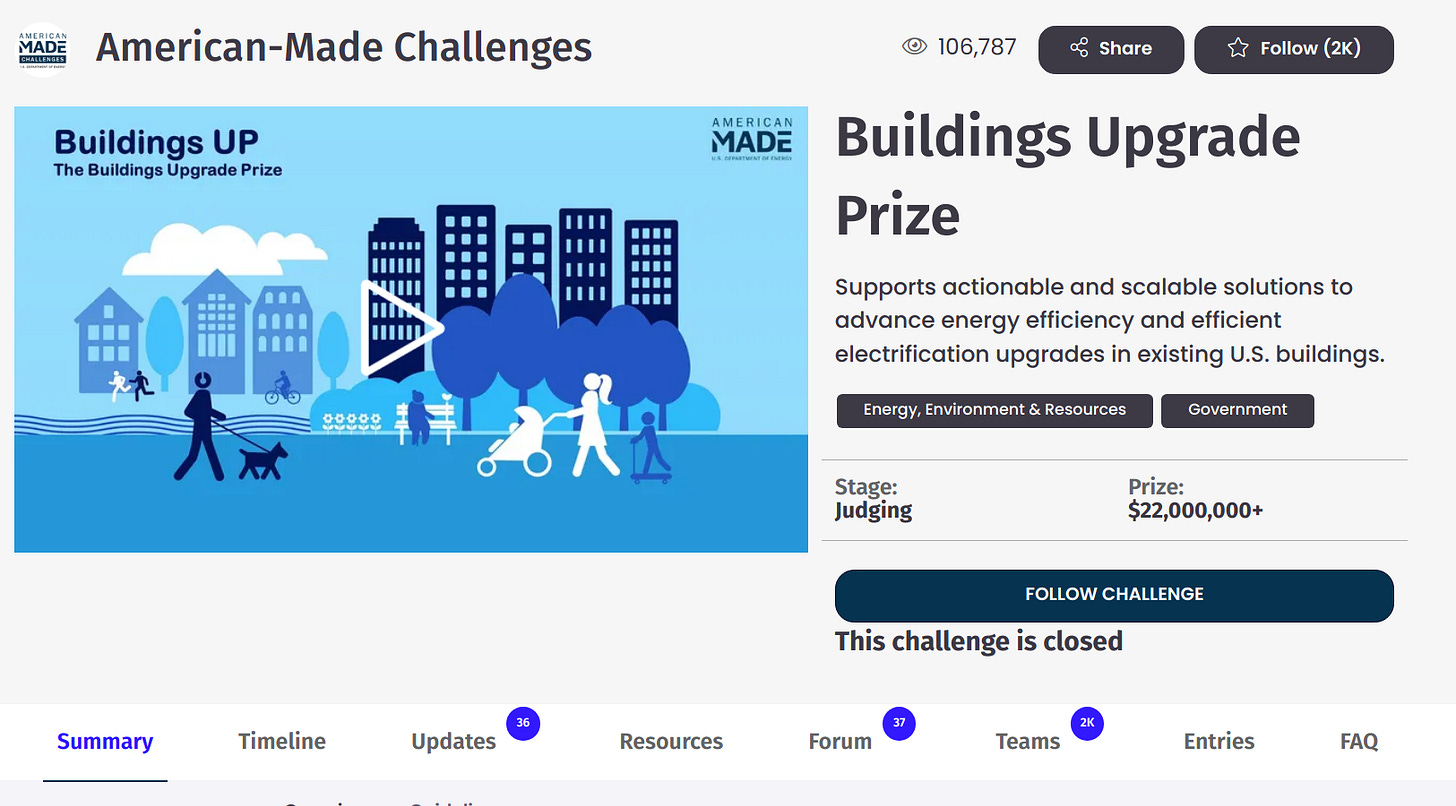The Curious Case of the Missing $333,000 Federal Prize Money
A Deep-Dive into the Evanston Development Cooperative
This story touches on a lot of issues in the world today: affordable housing, poorly administered federal programs, misused equity funding, and Trump’s executive orders on DEI. It’s longer than a normal story (it took me months of research), but stick with me here, it gets interesting.
Accessory Dwelling Units
First, you need to know what an accessory dwelling unit (ADU) is. You may know these as coach houses - they’re usually a garage or detached unit that is converted into a standalone rental. The City publishes a guide about ADUs that you can read here.
ADUs have bounced around the Evanston Government for some time:
September 16, 2019: City Council rejects giving a private homeowner a loan of $200,000 to build a pilot ADU. Watch the discussion.
January 13, 2020: City Council passes the first ordinance to permit ADUs in backyard coach houses.
April 13, 2020: City Council approves a $190,000 loan to the Housing Opportunity Development Corporation (HODC) to construct an ADU/coach house at 1930 Jackson Avenue. (More on this below)
September 29, 2020: City Council passes an ordinance 7-0 which fully legalizes ADUs. The terms are complicated, and you can read them in the ordinance.
September 14, 2021: City Council considers and rejects a six month moratorium on non-owner occupied internal ADUs.
June 26, 2024: Preservation Committee debates whether District 65 School Board member Omar Salem’s coach house constitutes an ADU. (He won in a 4-2 vote)
Fundamentally, the City views ADUs as an affordable housing thing - converting under-utilized carriage houses or garages into affordable housing is one way to provide affordable rental units. It gets a little messy with internal ADUs, especially near the student housing at Northwestern but in general, it’s about affordable housing.
Evanston Development Cooperative (EDC)
The moving force behind the expansion of ADUs is a group called the Evanston Development Cooperative (EDC). The EDC was founded in 2018 by a Northwestern student, Robinson Markus and Northwestern scientist, Dick Co - you can read the 2021 filing with the State. The EDC describes itself as a worker owned cooperative;
Our cooperative was initially started by two people who met at Northwestern University. One was a climate scientist concerned about carbon emissions in the built environment, and the other was researching the displacement of Black Evanston homeowners after the subprime mortgage crisis.
Both people believed that community is our only immunity from climate change, racism, and inequality, which inspired the creation of our local cooperative in 2018.
Since then, our cooperative movement has grown to seven worker-owners and more than 40 members in the community. Through their support and collaboration, our vision for a green construction co-op became a reality, survived the COVID-19 recession, and proudly serves the Evanston community today.
The EDC is a cooperative in the legal sense, it’s a for-profit entity where investors or workers become members in the coop. It’s not clear who the current owners are or how ownership is distributed.
The EDC was also literally close with City Hall - in January 2019, Council approved a lease agreement in City Hall for the organization;
A11) Resolution 111-R-18, One-Year Lease Agreement for Office Space at the Lorraine H. Morton Civic Center City Council adopted Resolution 111-R-18 authorizing the City Manager to negotiate the lease of office space with Evanston Development Cooperative (EDC) at the rate of $324.50 per month for 12 months beginning January 2, 2019 for 275 square feet of space on the third floor of the Civic Center, Suite 3601.
In 2018, they were awarded a Community Development Block Grant (CDBG) for $60,000 by the City, which was drawn down to pay wages in May 2020 and June 2021. According to the award performance documents, they employed two people.
City Council Involvement - Revelle and Nieuwsma
Because the EDC is a for-profit cooperative, the ownership of the entity is not public. However, 7th Ward Alderman Eleanor Revelle is an owner/member of the EDC. In 2019, when the EDC went to City Council to ask for a $200,000 loan for a homeowner to build an ADU, she had to recuse herself from the discussion as a member of the cooperative.
Also present at the founding of the cooperative was current 4th ward alderman, Jonathan Nieuwsma. According to an interview with Evanston Now;
I was a founding member of the Evanston Development Cooperative, a community-owned business that designs and builds affordable, sustainable housing by and for Evanston residents.
Mr. Nieuwsma was not on City Council at the time of the EDC’s founding.
1930 Jackson Street
In April 2020, they got their first big break, when the Council approved a $190,000 loan to the Housing Opportunity Development Corporation (HODC). According to the EDC, they would be the design-builder for the project.
In partnership with HODC, the Evanston Development Cooperative (EDC) will serve as the design-builder for this 2-bedroom ADU. It will be rented at 60% of the Area Median Income (AMI) or lower for 20 years or longer. The loan to Housing Opportunity Development Corporation will be forgiven following the successful completion of the required affordability period.
The application indicates that EDC would provide some specific energy efficient wall panels.
EDC utilizes structural insulated panels (SIPs) for their projects. As the exclusive contractor and installer of Eco-Panels SIPs in the Chicago region, EDC’s pre-engineered wall panels replace traditional stick frame construction for a stronger and significantly more energy efficient exterior wall system.
The project was successfully completed by October 2022, complete with a post in the Roundtable and a photo op with Mayor Biss, who said at the opening, “this has got to be one of many, because we have a ton of work ahead of us when it comes to affordable housing,”
So far, you ask “Tom, why am I reading this? Where’s the scandal?” This is where things start to get weird.
No Strings Attached Federal Money 💸
In 2022, the City launched this project called the “One Stop Shop” - you can read about it in the Roundtable. The general idea is that a handful of local organizations would team up and offer various subsidized housing services to residents of the Fifth Ward. According to the Roundtable;
Three affordable housing design and retrofit organizations will staff and run the shop: the Center for Neighborhood Technology and Elevate, two Chicago-based nonprofits, and the Evanston Development Cooperative.
To this end, in May 2023, the EDC applied for federal money under a program called the Buildings Up Prize, managed by the Department of Energy. I can’t actually link you to the site, because it was taken down by the Trump administration’s anti-DEI executive order (wayback machine).
This funding opportunity was unusual: it was a $400,000 prize that had absolutely no strings attached, no oversight guidelines, no reporting requirements, and wasn’t even administered on a federal website (HeroX.com). You can read the massive FAQ about the BuildingsUP Prize, which confirms the above;
When does money need to be spent by if we are awarded? Is it considered Federal money?
The Buildings Upgrade Prize does not establish requirements on the prize funding once awarded (e.g., there is no restrictions on how and when prize funds are used, there are no administrative requirements related to the use of prize funds. Prize awardees do not have to abide by 2 CFR 200.
Another answer explains that the money is deposited as a lump sum with absolutely no reporting requirements or accountability;
There are no restrictions on the use of the prize funding. The prize recipients will receive the funding in one lump sum and can be used however the winner see fit as was laid out in there submission. Make the case that dedicating the funds to this effort will achieve scalable initiatives to improve the community.
I’ve applied for federal grants before under various SBIR programs and the paperwork and reporting requirements are no joke: the application process requires business plans, go-to-market plans, and quarterly accounting. At the bare minimum, I have to maintain an account on sam.gov to prove I am a real person with a real business (for instance, linking my Dunn & Bradstreet number).
There appears to be very little if any due diligence on the applicants or recipients of these funds; the Department of Energy bypassed all the standard federal procurement processes by using this random website, herox.com. In fact, they even ignored their own scoring to tip the scales for certain awardees. For instance, here’s a case in the review where they prioritized a DC-area faith based organization over other applicants.1
The Buildings Up program alone was $22 million dollars in prizes (funded via the Inflation Reduction Act) and the federal staffer that signed off on the awards, had only been working for the department for one month.
EDC’s Application for $333,000 Prize
Anyway, in May 2023, the EDC applied with CNT for a $400,00 prize in this program under the “Equity-Centered Pathway”. CNT would receive $67,000 and the EDC would receive $333,000.
You can read all the documents I’ve obtained via FOIA:
Letter of Support from Latinos of Evanston (I’ve redacted their signatures)
The Department of Energy awarded $400,000 each to 45 winning submissions (6 Open Innovation and 39 Equity Centered Pathway), including EDC, who received the full $333,000 they requested. In the Department of Energy’s review, they gave the application an “A” grade with no further justification.
The EDC’s application focused primarily on contributing to the One Stop Shop Program and makes a promise regarding a pilot electrification program;
During this innovative pilot which aims to simplify the provision of various government renovation funding sources and make existing programs more accessible to under-resourced residents, we aim to perform electrification and weatherization retrofits on 50 units.
Mayor Biss also offered something of a promise on those 50 homes;
Our goal is to build a sustainable and scalable program that will preserve affordability, drastically reduce carbon emissions, and maximize local economic impacts on building owners, residents, and businesses. To date, we have secured $1,500,000 to serve at least 50 housing units with combinations of deep energy and water savings, solar, electrification, decarbonization and health and safety improvements like lead abatement.
It’s not clear which housing units are covered under this program, besides being part of census tracts 8092 (5th Ward) or 8102 (8th Ward).
EDC Founder moves to Ecuador 🌎
The application was submitted by the EDC in May 2023 and according to the Department of Energy, the $333,000 was deposited in a single transfer in October 2023. According to his LinkedIn, Mr. Markus (the founder of the EDC) moved to Quito, Ecuador in September 2023, one month before the funds were deposited. He’s currently in London.
After his departure, the EDC seems to have ceased doing business and as far as I can tell, there was little or no work done using the funds. I was unable to identify any units that were retrofitted.
According to an email obtained via FOIA between a First Ward Alderman Kelly and City Staff from mid-2024, the EDC essentially ceased doing business in the program, causing significant delays in the One Stop Shop and Green Homes program;
However, EDC, after actively participating in the development of the pilot for several months, experienced several leadership changes and has ceased to be a functional non-profit partner. EDC was responsible for the majority of the construction phase, and their departure has been disruptive to progress. CNT and Elevate have had to re-establish their own organization's responsibilities and divide up the tasks of EDC, renegotiate the contract they have with one another, and identify a path forward.
You can read CNT’s current summary of the project, which omits mention of the EDC.
So, Where’s the Money❓
So what happened to the $333,000? The answer is: I don’t know.
The first person I reached out to was Mr. Markus, the EDC founder and applicant on the paperwork. I spoke with him briefly on LinkedIn;
Tom: Hey Robinson - I'm a writer in Evanston (foiagras.com) and I'm working on a story involving the Buildings Up grant that the DoE awarded to the EDC. Are you willing to chat about it? Thanks!
(some small talk about mutual people we know)
Mr. Markus: Unfortunately, I don’t know much about Buildings UP, as EDC received the grant after my time with the organization, when I was on a research fellowship in Ecuador.
I also reached out to the other co-founder, Dick Co, via email who gave me the following comment.
I left EDC in March 2022 as an employee. I stayed on the Board for a few more months until December 2022 when I moved out of state. Since I was no longer an IL resident, I wasn’t eligible to be a coop member. I guess EDC hasn’t updated its website in a while...
I reached out to City Council members Revelle (on Jan 4) and Nieuwsma (on Jan 10), who are founding members or investors in the cooperative, and received no reply. I reached out to the City and Mayor’s Office, who didn’t have further information and since they weren’t recipients of the money, didn’t know the status. I reached out to the Department of Energy Media Office, who likely couldn’t reply to my email because of the Trump Communication Freeze.
I reached out to any contact I could find at the EDC and received no reply. This includes the current Coop President on the State’s records and other individuals listed on the application at CNT. Nobody returned my calls or emails. I reached out to as many people I could find that were a member of the cooperative and nobody knew anything.
However, this topic did come up in the December 9, 2024 City Council meeting when the Council was voting on a contract for one of the vendors for the One Stop Shop, Elevate (Youtube Link)
Council Member Kelly: The Evanston Development Corporation [sic] applied for a Department of Energy grant for about $330,000 for our Green Homes Programs / One Stop Shop and we haven’t been able to secure that funding which was allocated at the federal level from the Department of Energy. I know Daniel, that you wrote a letter to help them get that grant, and as of last week we still weren’t able.
Mayor Biss: Yeah, it’s a great question and I don’t know if EDC has legally dissolved, but as you said Dick Co, who was the founder, moved to New Jersey and Robbie Markus who essentially took that role over, is spending a year in Central America, or perhaps South America. My intent was, given that we don’t have a point of contact in Evanston any longer, try to get back in touch with the folks who are no longer in town to work on this. Because you’re right, it’s a frustrating situation to say the least, if we can’t recover the funding. I don’t know, Ms Pratt if you need to add to that.
Cara Pratt (City Sustainability and Resilience Manager): … The department of Energy Buildings Up prize was a capacity building grant so that the Evanston Development Cooperative could fulfill the contract that they had to do this work. It wasn’t for equipment directly. But I do appreciate drawing attention to this matter.
If you’ve seen the $333,000 please leave a comment or email tom@foiagras.com!









I would like this question asked of Joanathan Nieuwsma at every single council meeting since he thinks he can run for reelection and not tell the city where this money is. Revelle is a lost cause since she isn't running again and has given up on the 7th ward and is back to bowing to NU.
Thank you for this deep dive into the missing $333,000. This money has been missing for a while, and it is concerning that when Council Member Kelly raised the issue at a recent council meeting, Revelle and Nieuwsma did not address it. It is unacceptable that Eleanor Revelle (7th Ward) and Jonathan Nieuwsma (4th Ward), both members of the Economic Development Committee (EDC), along with Mayor Biss—who helped secure federal funding for the EDC—are not actively working to locate the missing funds, which were intended to assist those in need. This is yet another example of a lack of financial accountability in the City Of Evanston.